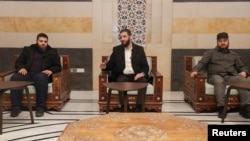With the militant group Hayat Tahrir al-Sham (HTS) consolidating power in Syria following the ouster of President Bashar al-Assad, many Syrians fear the influence of extremist factions within the Islamist organization.
HTS, a U.S.-designated terrorist group, emerged as the de facto ruler of Syria after Assad’s fall on December 8, following an 11-day rebel offensive. Formerly known as al-Nusra Front, the HTS was the main affiliate of al-Qaida in Syria until 2017, when it formally severed ties with the global terror group.
Since seizing control of Damascus, HTS leader Ahmad al-Sharaa -- formerly known by his nom de guerre, Abu Mohammed al-Jolani, has adopted a more moderate stance, pledging to establish a state founded on tolerance and coexistence among the country’s diverse ethnic and religious groups.
Despite such overtures, many Syrians remain skeptical about the new rulers’ ability to rein in the more radical elements within HTS.
Al-Masri, a resident of Damascus who provided only his last name, acknowledged that the new authorities have largely maintained order in the capital and elsewhere but expressed concerns that this stability could be short-lived.
“We know that Hayat Tahir al-Sham is trying to change, and we welcome that,” he told VOA via a messaging app.
“But there are two things that people in my circle are really concerned about. One is how genuine al-Sharaa is, and the other is how much control he really has over the more radical people in his group,” said al-Masri, who is a Sunni Muslim.
His fears were echoed by another resident of Damascus who spoke to VOA on the condition of anonymity.
“Syrians in general, including the conservative ones, are not inclined to extremism,” the resident said. “If al-Jolani keeps his promises and controls his men, then Syrians will support him. But if extremists dominate, Syrians will rise against them just as they rose against Bashar al-Assad,” the resident added, referring to the popular uprising against the former regime that began in 2011.
Aymenn Jawad al-Tamimi, an expert on Islamist groups in Syria, says one of the main tensions he sees is “between the HTS leadership under al-Jolani and the action of individual members who for years were fed propaganda” about other religions and sects.
“They may collectively impute guilt to Alawites and others like Christians and engage in attacks and insults,” he told VOA.
On Monday, armed gunmen burned down a Christmas tree in the Christian-majority town of Suqaylabiya in Hama province in central Syria. Shortly after that, the HTS issued a statement saying the perpetrators, whom it described as foreign fighters, will be punished.
While their exact numbers are unknown, fighters from several countries have joined HTS over the years, with Uighurs from China’s Muslim-majority region of Xinjiang being most notable.
Aaron Zelin, a senior fellow at the Washington Institute for Near East Policy, said there have not been any indications of opposition within the main ranks of HTS toward al-Jolani’s current moderate approach.
“Even if there are people on their farther right flank that might be upset with them, it is plausible that if they then act out, the HTS and the caretaker government will arrest them,” he told VOA.
“I’m sure there are a lot of internal discussions and debates about how far they can go,” Zelin added. “There are also the questions for some of them like ‘We will wait and see what this is like until the transition is over,’ and if this is just a public relations campaign, then maybe we will see some differences and changes and more reactions,” Zelin added.
HTS has appointed a caretaker government, composed of loyalists, to manage affairs until March 1, 2025, the new government’s own deadline for initiating a transitional process.
Caroline Rose, director of the Strategic Blind Spots Portfolio at the Washington-based New Lines Institute, believes “that ultimately al-Sharaa will sideline the more extremist factions within HTS, the caretaker government, and the new government post-March 1.”
She told VOA that this approach could particularly work if foreign governments “keep normalization, sectoral sanctions relief, and delisting [from lists of designated terrorist groups] as an opportunity and a ‘carrot’ to incentivize behavioral change.”




